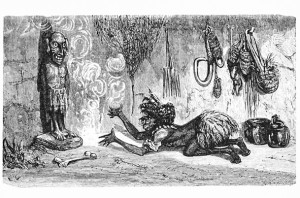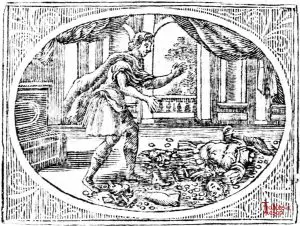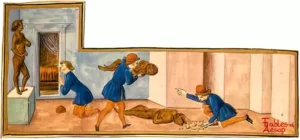A Man prayed to a wooden God to no avail. One day he threw the idol so hard it broke and inside he found coins. Strange way to answer prayers.
People expect religion to give them profit.

Eliot/Jacobs Version
In the old days men used to worship sticks and stones and idols, and prayed to them to give them luck. It happened that a Man had often prayed to a wooden idol he had received from his father, but his luck never seemed to change. He prayed and he prayed, but still he remained as unlucky as ever. One day in the greatest rage he went to the Wooden God, and with one blow swept it down from its pedestal. The idol broke in two, and what did he see? An immense number of coins flying all over the place.

JBR Collection
A poor Man, who longed to get rich, used to pray day and night for wealth, to a Wooden Idol which he had in his house. Not withstanding all his prayers, instead of becoming richer, he got poorer. Out of all patience with his Idol, he one day took it by the legs, and dashed it to pieces upon the floor. Hundreds of gold pieces, which had been hidden in the body, flew about the room. Transported at the sight, he exclaimed, “How have I wasted my time in worshipping a graceless deity, who yields to force what he would not grant to prayers!”

Townsend version (The Image of Mercury and The Carpenter)
A very poor man, a Carpenter by trade, had a wooden image of Mercury, before which he made offerings day by day, and begged the idol to make him rich, but in spite of his entreaties he became poorer and poorer. At last, being very angry, he took his image down from its pedestal and dashed it against the wall. When its head was knocked off, out came a stream of gold, which the Carpenter quickly picked up and said, “Well, I think thou art altogether contradictory and unreasonable; for when I paid you honor, I reaped no benefits: but now that I maltreat you I am loaded with an abundance of riches.”

Samuel Croxall
A MAN having a Wooden God, worshipped it every day; and among other things, prayed particularly for wealth, because his circumstances were but low. But when he had continued to do this for many days to no purpose, in a passion at the disappointment, he took the image by the legs, knocked it against the pavement, and broke it in pieces; upon which a great quantity of money, which had been inclosed within it, flew about the room. The Man no sooner perceived this, but addressing himself to the idol, Thou obstinate, perverse deity, says he, who, while I humbly besought thee, hadst no regard to my prayers, but now thou art used ill, and broken to pieces, dost pour forth good things, in even a greater abundance than I could desire.
THE APPLICATION
This is a fable of a very extraordinary composition; if, as the ancient mythologists say, it is designed to signify no more than, that where fair means will not do, foul must be used. Indeed some natures are so very rough and untractable, that gentle usage and moderate treatment are thrown away upon them; they must be wrought upon like stubborn metals, by blows frequently and heartily applied. But what has all this to do with religion and the worship of God? The fable is useless in that respect, unless we consider it in this light, that the adoration of images is the most stupid part of religion that ever was invented. How any of the sober, sensible heather! world could be induced, so as to give into such an unreasonable piece of devotion, is astonishing; or how could they suppose that a senseless stock or stone, which had neither life nor motion in it, could understand their complaints and redress their grievances: such a supposition must be monstrously absurd and foolish. But what then must we think of those Christians, who blindly run into the same practice, tho’ they have an acknowledg- ed and received command from the God they worship, absolutely forbidding it! What was only stupidity in the heathens, in them is gross wickedness and profane, impudent impiety. But the people who can be made to believe that this is right, may be taught to swallow any thing, and consequently are the fittest tools to carry on the trade of priestcraft.

L’Estrange version
A man that had a great veneration for an image he had in his house, found, that the more he pray’d to’t to prosper him in the world, the more he went down the wind still. This put him into such a rage, to lye dogging at his prayers so much, and so long, to so little purpose, that at last he dasht the head on’t to pieces against the wall; and out comes a considerable quantity of gold. Why this ’tis, says he, to adore a perverse and insensible deity, that will do more for blowes than for worship.
Moral
Most people, clergy as well as laity, accommodate their religion to their profit, and reckon that to be the best church that there’s most to be got by.

Gherardo Image from 1480
Perry #285


